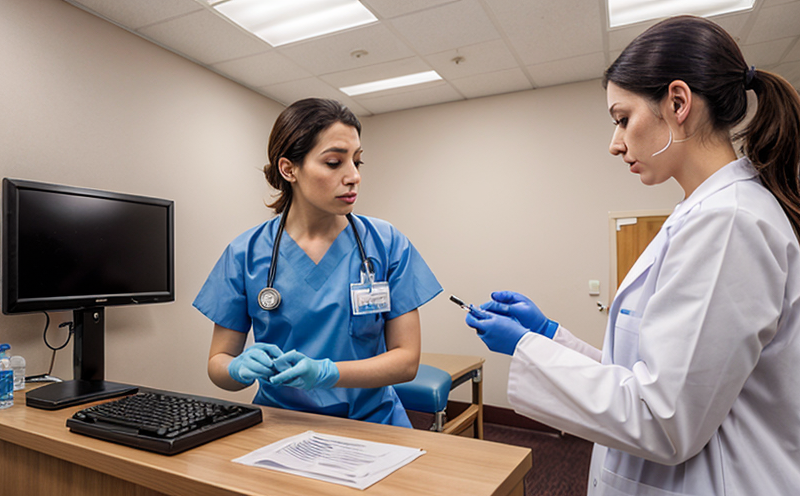Arsenic Testing in Rice and Seafood Samples
Testing for arsenic in rice and seafood samples is a critical process that ensures consumer safety and compliance with international standards. Arsenic, a heavy metal, can be found naturally in the environment but may also enter food chains through contamination from soil, water, or industrial emissions.
The presence of arsenic in these products can pose significant health risks, particularly when consumed over extended periods. Chronic exposure to high levels of arsenic has been linked to various health problems including cardiovascular diseases, diabetes, and cancers such as bladder, lung, and skin cancer. Therefore, rigorous testing is essential for maintaining public health.
Arsenic exists in several forms, known as species: Arsenite (As(III)), Arsenate (As(V)), and Mono-methylarsonic acid (MMA). Each form has different toxicological profiles, which complicates the testing process. The challenge lies not only in detecting arsenic but also in determining its specific chemical form to understand the potential risk accurately.
In rice, arsenic contamination often stems from contaminated irrigation water or soil, while seafood may be affected by pollution in aquatic environments. The European Union and other regulatory bodies have set maximum limits for total and inorganic arsenic in food products to mitigate these risks. Our laboratory uses state-of-the-art equipment and methods compliant with international standards such as ISO 17025.
The testing process involves several key steps, starting with sample preparation. For rice samples, this includes thorough cleaning, grinding, and digestion using acid solutions like nitric or hydrochloric acids. Seafood samples require different handling to preserve the integrity of the tissue and extract arsenic accurately. After digestion, the solution is filtered and analyzed.
Our laboratory employs advanced techniques such as inductively coupled plasma mass spectrometry (ICP-MS) for precise quantification. This method allows us to detect even trace amounts of arsenic down to parts per billion levels. We also use high-performance liquid chromatography with inductively coupled plasma mass spectrometry (HPLC/ICP-MS) to separate and identify different arsenic species.
The results are reported according to the relevant standards, including the concentration of total arsenic and its individual species. These reports are crucial for food manufacturers, importers, and regulatory authorities to ensure compliance with local and international regulations. Our comprehensive testing services provide peace of mind by offering accurate, reliable data that can be used to improve product quality or make necessary adjustments.
Our laboratory has conducted extensive research on arsenic contamination in various rice and seafood samples from different regions worldwide. This expertise enables us to offer tailored solutions for clients facing specific challenges related to arsenic testing in their products.
Eurolab Advantages
- Accreditation by ISO 17025 ensures our laboratory meets the highest standards of quality and reliability.
- A highly experienced team with expertise in environmental, food safety, and toxicological testing.
- Use of cutting-edge technology including ICP-MS and HPLC/ICP-MS for precise measurements.
- Compliance with international standards such as ISO, EU regulations, and other relevant guidelines.
- Extensive experience in handling complex samples from diverse geographical regions.
International Acceptance and Recognition
The importance of arsenic testing is recognized globally due to the potential health hazards associated with its presence in food products. Regulatory bodies like the European Union, United States Food and Drug Administration (FDA), and World Health Organization (WHO) have established guidelines and limits for total and inorganic arsenic in rice and seafood.
Our laboratory adheres strictly to these standards, ensuring that our test results are accepted worldwide. This global recognition enhances the credibility of our reports, making them valuable tools for compliance purposes. Clients can rely on our services not only within Europe but also beyond, knowing that their products meet international safety requirements.
By choosing Eurolab, clients benefit from a laboratory that is trusted by numerous industries and organizations committed to food safety and quality assurance. Our commitment to excellence and accuracy ensures that we remain at the forefront of arsenic testing, providing reliable data that can be used to protect public health and enhance product reputation.
Competitive Advantage and Market Impact
- Our unique combination of advanced technology and experienced personnel gives us an edge over competitors in delivering accurate, reliable test results swiftly.
- A comprehensive understanding of the latest regulations and guidelines ensures we stay ahead in meeting evolving market demands.
- Client satisfaction is paramount; our detailed reports provide actionable insights that help improve product quality and safety.
- We offer rapid turnaround times, allowing clients to make timely decisions based on our findings.





